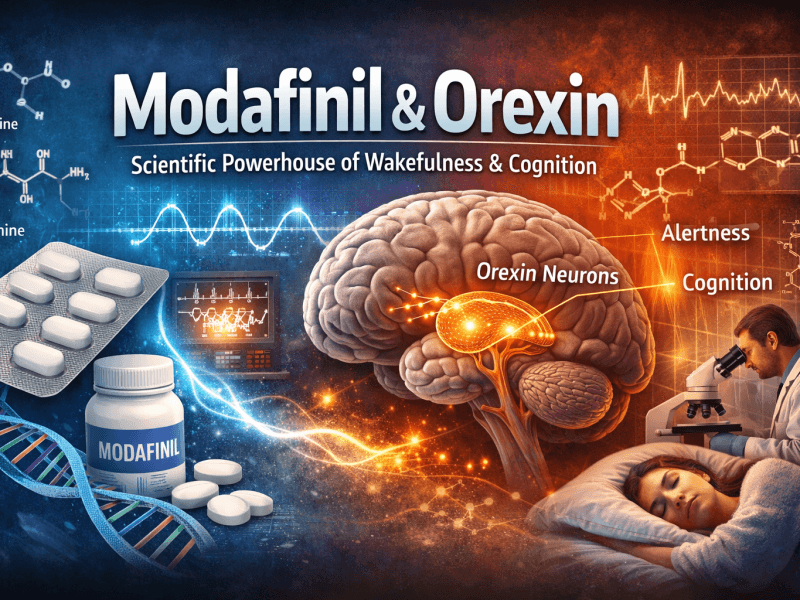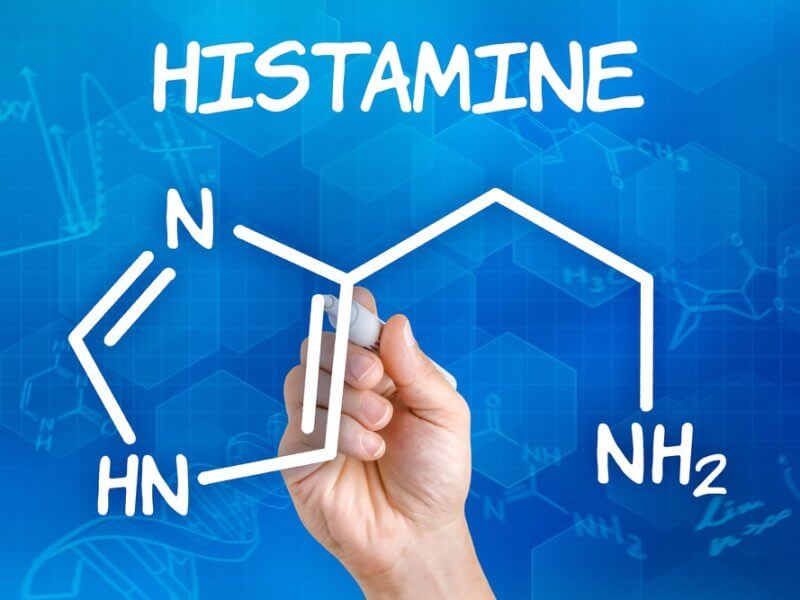Last Updated on 04/02/2026 by James Anderson
Introduction: The Modern Challenge of Circadian Mismatch
Delayed Sleep Phase Syndrome (DSPS) is more than a preference for late nights; it is a chronic, genetically-influenced misalignment between an individual’s internal circadian clock and the 24-hour day. This results in an inability to fall asleep and wake at socially conventional times, often leading to significant functional impairment, chronic sleep debt, and comorbid health risks.
In the landscape of DSPS management, Modafinil represents a unique therapeutic tool. It is not a cure for the underlying circadian delay, but a strategic agent for managing its most debilitating consequence: excessive daytime sleepiness and cognitive impairment. This analysis will delve beyond the standard overview, exploring the precise neurobiology of DSPS, Modafinil’s targeted mechanism of action, its role within a comprehensive treatment matrix, and the critical protocols required for effective and safe use. Our goal is to provide a framework that moves from mere symptom suppression to genuine circadian rehabilitation.
The Neurobiology of DSPS – Why “Just Go to Bed Earlier” Fails
Understanding DSPS requires moving past behavioral explanations to a biological foundation:
- Core Pathophysiology: At its heart, DSPS involves an abnormally long endogenous circadian period (tau), often longer than 24.1 hours. This means the internal clock runs slower than the environmental day-night cycle, causing a daily “delay drift.” Additionally, there is often a heightened sensitivity to evening light (which further delays the clock) and a diminished response to morning light (the primary signal to advance it).
- The “Forbidden Zone” for Sleep: Individuals with DSPS typically have a delayed onset of melatonin secretion. Their “sleep gate,” or the time when the pineal gland begins secreting melatonin to induce sleepiness, may not open until 2 AM, 4 AM, or later. Attempting to sleep before this biological gate opens is physiologically akin to trying to sleep in the middle of the afternoon for a typical sleeper resulting in frustration and insomnia.
- Consequences of Chronic Misalignment: The resulting forced early wake times for work or school lead to chronic, cumulative sleep deprivation. This manifests not as simple tiredness but as severe excessive daytime sleepiness (EDS), brain fog, attentional lapses, depressed mood, and impaired executive function the very symptoms that profoundly impact quality of life.
Modafinil’s Mechanism: A Precision Tool for Wakefulness (Not Sleep Initiation)
Modafinil is a wakefulness-promoting agent (eugeroic), distinct from classical stimulants. Its value in DSPS lies in its targeted, clean action:
- Primary Neurochemical Action: Modafinil’s key mechanism is the inhibition of the dopamine transporter (DAT), increasing extracellular dopamine in key brain regions like the nucleus accumbens and prefrontal cortex. This provides the motivation, alertness, and cognitive clarity often stripped away by sleep debt.
- Supporting Roles: It also increases extracellular levels of norepinephrine (promoting arousal and vigilance), orexin (a primary peptide for stabilizing wakefulness), and histamine. Crucially, it does not create a generalized sympathetic “fight-or-flight” surge, minimizing jitteriness and anxiety compared to amphetamines.
- Strategic Application in DSPS: In the DSPS context, Modafinil does not shift the circadian clock. Instead, it acts as a “bridge” during the challenging morning and afternoon hours. By pharmacologically enforcing alertness during the desired wake period, it can: 1) Reduce the immediate impairment from sleep deprivation, and 2) Potentially make it easier for an individual to engage in the very behaviors (morning light exposure, consistent wake time) that can gradually advance their clock.
The Comprehensive DSPS Treatment Matrix – Where Modafinil Fits
Modafinil is most effective as one component of a multi-modal treatment plan. The following table illustrates how it interacts with foundational circadian therapies:
| Treatment Modality | Primary Target & Mechanism | Role in DSPS Management | Synergy with Modafinil |
|---|---|---|---|
| Chronotherapy / Timed Light Therapy | Circadian Clock (Core Pathology). Bright light in the first hour after waking suppresses melatonin and provides the strongest “phase advance” signal. | The cornerstone treatment for permanently shifting the sleep-wake schedule earlier. | Modafinil helps the patient wake up consistently for morning light therapy, even when sleep-deprived. It ensures alertness during the light exposure window, maximizing adherence. |
| Cognitive Behavioral Therapy for Insomnia (CBT-I) | Maladaptive Behaviors & Arousal. Addresses sleep effort, anxiety about sleep, and incorrect sleep scheduling. | Teaches sleep restriction and stimulus control to consolidate sleep and reduce time in bed awake. Critical for managing insomnia. | CBT-I helps establish the fixed wake time that Modafinil supports. Modafinil reduces daytime sleepiness, making strict sleep restriction more tolerable. |
| Sleep Hygiene & Behavioral Consistency | Environmental Cues. Regular sleep/wake times, dark/quiet bedroom, limiting evening blue light. | Provides the stable framework necessary for any other treatment to work. Non-negotiable foundation. | Makes the effects of Modafinil more predictable. Poor sleep hygiene can undermine its benefits and worsen side effects like insomnia. |
| Modafinil (Pharmacotherapy) | Daytime Symptoms. Promotes wakefulness and cognitive function via dopaminergic/noradrenergic pathways. | Adjuvant/Symptomatic Management. Reduces the functional disability caused by EDS while other treatments address the root cause. | The focus of this article. It enables participation in the other three pillars. |
A Strategic Protocol for Modafinil Use in DSPS
Preparation & Medical Clearance (Week 0)
- Formal Diagnosis: DSPS must be confirmed, ideally via a sleep diary or actigraphy over several weeks, to rule out other sleep disorders.
- Medical Evaluation: A physician must assess cardiovascular health, psychiatric history (especially anxiety or bipolar disorder), and medication interactions (hormonal contraceptives).
- Goal Setting: Define the target wake time. Modafinil will be a tool to protect this time.
Initiation & Titration (Weeks 1-2)
- Start Ultra-Low: Begin with 50mg upon waking at the target time. This tests tolerability.
- Titrate for Effect: If needed, increase to 100mg, then 200mg, in weekly increments. The goal is the lowest dose that provides consistent, comfortable alertness until midday. A dose >200mg daily is rarely needed for DSPS and increases side-effect risk.
- Absolute Timing Rule: Never dose after 10 AM. Given its 12-15 hour half-life, later administration guarantees interference with sleep onset, worsening the core DSPS problem.
Integration & Synergy (Week 3 Onward)
- Mandatory Morning Light: Take Modafinil, then immediately seek 30+ minutes of bright light (10,000 lux light therapy box or outdoor light). The drug facilitates alertness for the light exposure, which is the true clock-shifting agent.
- Enforce the Wake Time: Use Modafinil to stay awake and engaged until at least 4 PM, regardless of prior night’s sleep. This “sleep pressure” build-up will help with earlier sleep onset.
- Monitor & Journal: Track dose, wake time, light therapy, subjective alertness (1-10 scale), and eventual sleep onset. This data is critical for optimizing the protocol.
Risks, Side Effects, and Long-Term Considerations
- Primary Risks: Insomnia is the paramount risk if dosed too late. Headache and anxiety are common initial side effects, often mitigated by proper hydration, starting low, and ensuring a caloric intake.
- Tolerance & Dependency: While physical addiction risk is low, psychological dependence can develop. The long-term strategy must be to use Modafinil as a temporary scaffold while building sustainable circadian habits. Plans should include “drug holidays” on weekends or low-demand days to assess natural wakefulness.
- The “Temporary Fix” Paradox: Used in isolation, Modafinil is indeed just a mask. However, when strategically embedded within the treatment matrix above, it acts as a catalytic enabler, making the hard work of circadian realignment physiologically possible and sustainable.
FAQ
Can Modafinil alone cure my DSPS?
No. It is a symptomatic treatment for daytime sleepiness. A “cure” or lasting management requires phase-resetting therapies like timed bright light therapy and strict behavioral scheduling to gradually advance your internal clock. Modafinil is a tool to help you implement those therapies effectively.
I take Modafinil and feel alert, but I still can’t fall asleep before 4 AM. What’s wrong?
This confirms Modafinil is working on wakefulness but not affecting your circadian phase. Your sleep onset time is governed by your delayed melatonin rhythm. You must add evening darkness (blue-light blocking glasses 2-3 hours before bed) and consistent morning light exposure immediately upon taking Modafinil to gradually shift your phase earlier.
Is Armodafinil (Nuvigil) better for DSPS than Modafinil?
Armodafinil, the R-enantiomer, has a longer half-life and may provide a smoother, more sustained alertness throughout the day. This can be advantageous for DSPS. However, the later peak concentration also increases the risk of insomnia if not taken extremely early (6-7 AM). The choice is individual and should be made with a doctor.
How long should I expect to use Modafinil?
The ideal use is temporary (3-12 months) as a “training wheel.” Its primary role is to provide immediate functional relief and enable adherence to light therapy and fixed schedules. As your circadian clock advances and your sleep debt resolves, the dose should be tapered down under medical guidance, aiming for eventual discontinuation while maintaining the new schedule with behavioral tools alone.
Conclusion: Towards a Strategic, Integrated Future for DSPS Care
Modafinil’s role in Delayed Sleep Phase Syndrome is being redefined. It is no longer viewed merely as a standalone treatment for sleepiness but as a potent strategic adjuvant within a neurologically-informed treatment protocol. Its true value is unlocked when it empowers the patient to consistently engage with the fundamental treatments light therapy and behavioral scheduling that actually modify the dysfunctional circadian machinery.
Successful DSPS management requires moving from a pharmacocentric model to a biobehavioral model. In this framework, Modafinil is the precision tool that provides the immediate cognitive clarity and wakefulness necessary to diligently perform the daily actions that, over time, retrain the brain’s master clock. By adopting this integrated, patient-specific approach, individuals with DSPS can achieve not just temporary symptom relief, but lasting realignment and restored daytime function.
‼️ Disclaimer: The information provided in this article about modafinil is intended for informational purposes only and is not a substitute for professional medical consultation or recommendations. The author of the article are not responsible for any errors, omissions, or actions based on the information provided.
References:
- U.S. Food and Drug Administration. PROVIGIL. U.S. Department of Health and Human Services. https://www.accessdata.fda.gov/drugsatfda_docs/label/2015/020717s037s038lbl.pdf . 2015
- Ballon JS, Feifel D. A systematic review of modafinil: potential clinical uses and mechanisms of action. J Clin Psychiatry. 2006
- Willavize, S. A., Nichols, A. I., & Lee, J. Population pharmacokinetic modeling of armodafinil and its major metabolites. https://doi.org/10.1002/jcph.800 . 2016
- Fuxe K, et al. Modafinil enhances the increase of extracellular serotonin levels induced by the antidepressant drugs fluoxetine and imipramine: a dual probe microdialysis study in awake rat. Synapse. 2005
- Mechanisms of modafinil: A review of current research. nih.gov. 2007
- PROVIGIL (modafinil) Tablets. FDA.GOV. 2010
- Oliva Ramirez A, Keenan A, Kalau O, Worthington E, Cohen L, Singh S. Prevalence and burden of multiple sclerosis-related fatigue: a systematic literature review. https://doi.org/10.1186/s12883-021-02396-1 . 2021.
- Ciancio A, Moretti MC, Natale A, Rodolico A, Signorelli MS, Petralia A. Personality Traits and Fatigue in Multiple Sclerosis: A Narrative Review. Journal of Clinical Medicine. https://doi.org/10.3390/jcm12134518 . 2023
- Mereu, M., Bonci, A., Newman, A. H., & Tanda, G. The neurobiology of modafinil as an enhancer of cognitive performance and a potential treatment for substance use disorders. https://doi.org/10.1007/s00213-013-3232-4 . 2013
- Ciancio A, Moretti MC, Natale A, Rodolico A, Signorelli MS, Petralia A. Personality Traits and Fatigue in Multiple Sclerosis: A Narrative Review. Journal of Clinical Medicine. https://doi.org/10.3390/jcm12134518 . 2023
- Natsch, A. What makes us smell: The biochemistry of body odour and the design of new deodorant ingredients. CHIMIA International Journal for Chemistry. https://doi.org/10.2533/chimia.2015.414 . 2015


